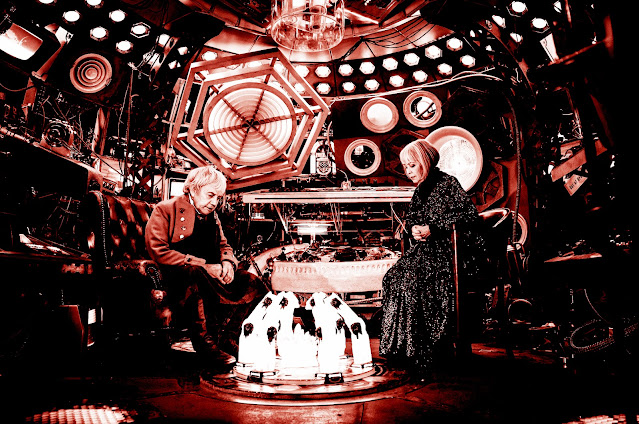TALES OF THE TARDIS.
The
six-part anthology featuring returning Doctors and companions, is informed by wistful,
sad, honest and mature reflections on the consequences of getting older. There’s
reconciliation (Jamie and Zoe), coming to terms with a trauma (Tegan and the
Fifth Doctor, in which he specifically refers to his and Tegan’s shared
experience as “therapy”), bad things happening for a good reason (the Sixth
Doctor and Peri), guilt about those lost along the way (the Seventh Doctor and
Ace), the ache of nostalgia and wish to be reunited with old friends (Steven
and Vicki) and, in a limited lifespan, the urgency of telling the people you
love that you love them (Clive and Jo).
Sixty years into Doctor Who’s
ever expanding lifespan, it’s no longer important that most of the actors who
played the Doctor don’t look the same as they did in their heyday. It also
doesn’t matter that, with the first three passing away many years ago, new performers
can step up to fill a regeneration’s vacant shoes. (I still remember the
both-legs-in-one-knicker froth in the Doctor Who Appreciation Society over
Richard Hurndall being cast as the original Doctor in the 20th anniversary
story, ‘The Five Doctors’). Free from this creative straitjacket, the story
possibilities are legion, as Tales of the TARDIS makes clear.
Every frame of these joyous vignettes
is illuminated by how much the writers RTD, Phil Ford and Pete McTighe love Doctor
Who. There are some lovely moments. Ace (below right) reveals she loved the Doctor “like
the dad I never had” and he gently returns the compliment, while confessing in
the same conversation that he manipulated and used her. Then there’s Sarah Jane
Smith’s owl and Colin Baker giving his best performance as the Doctor. For me,
the most poignant moment is white-haired old Jamie still wondering about Victoria, clearly the love of his life.
I’m happy to report that, as with all Doctor
Who, there's something to annoy the “anti-woke” brigade. Jo, Tegan and
Rani Chandra from The Sarah Jane Adventures are environmental activists,
while Ace is the CEO of the philanthropic organisation A Charitable Earth. Deal
with it.
It’s in The Mind Robber episode that the
framing of the anniversary scenes around a ‘classic’ serial works most
effectively. It’s possible the 1968 Patrick Troughton story is a shared
hallucination, so presenting Zoe and Jamie’s story as a dream within a dream,
or a fantasy within a fantasy, is clever artistically. It’s conceivable too
that the “memory TARDIS” is a time travelling Charon, transporting its reunited
passengers to the afterlife. The waiting room to Heaven is traditionally the
place where ghosts are laid to rest, and estrangements reconciled.
I shed a tear at all of the Tales of the
TARDIS, but the one that had the most emotional impact on me was The
Time Meddler. It was incredibly moving to see these two elderly people, Steven
and Vicki (below), in their twilight years, talking about their achievements and
families, still missing their old friend the Doctor and wishing him back into
their lives. My heart was in my throat at that point, because I thought - if
only for a second - that David Bradley, who played the First Doctor in 'The Doctor Falls', 'Twice Upon a Time' (both 2017) and 'The Power of the Doctor' (2022), was about to step into shot.
It could have happened. Tales of the TARDIS is that magical.
The six-part anthology featuring returning Doctors and companions, is informed by wistful, sad, honest and mature reflections on the consequences of getting older. There’s reconciliation (Jamie and Zoe), coming to terms with a trauma (Tegan and the Fifth Doctor, in which he specifically refers to his and Tegan’s shared experience as “therapy”), bad things happening for a good reason (the Sixth Doctor and Peri), guilt about those lost along the way (the Seventh Doctor and Ace), the ache of nostalgia and wish to be reunited with old friends (Steven and Vicki) and, in a limited lifespan, the urgency of telling the people you love that you love them (Clive and Jo).





Comments
Post a Comment